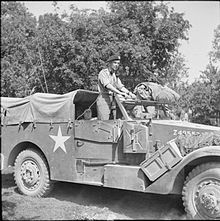Philip Roberts | |
|---|---|
 Major-General "Pip" Roberts, GOC 11th Armoured Division, in his White Scout Car, in Normandy, August 1944. | |
| Nickname(s) | "Pip"[1] |
| Born | 5 November 1906 Quetta, British India |
| Died | 5 November 1997 (aged 91) East Sussex, England |
| Allegiance | United Kingdom |
| Service | British Army |
| Years of service | 1926–1949 |
| Rank | Major-General |
| Service number | 34890 |
| Unit | Royal Tank Regiment |
| Commands | 2nd Infantry Division (1947–1949) 7th Armoured Division (1946–47) 11th Armoured Division (1943–46) 30th Armoured Brigade (1943) 26th Armoured Brigade (1943) 22nd Armoured Brigade (1942–43) 3rd Royal Tank Regiment (1942) |
| Battles / wars | Second World War |
| Awards | Companion of the Order of the Bath Distinguished Service Order & Two Bars Military Cross Mentioned in Despatches (3) Legion of Honour (France) Croix de guerre (France) |
| Other work | Director of Scribbans-Kemp (1949–64) Honorary Colonel Kent and County of London Yeomanry Squadron (1962–70) Justice of the Peace (1960–70) |
Major-General George Philip Bradley Roberts, CB, DSO & Two Bars, MC (5 November 1906 – 5 November 1997), better known as "Pip", was a senior officer of the British Army who served with distinction during the Second World War, most notably as General Officer Commanding of the 11th Armoured Division (nicknamed the "Black Bull") throughout the campaign in Northwestern Europe from June 1944 until Victory in Europe Day (VE-Day) in May 1945. Roberts, in the words of Richard Mead, "possessed strong leadership, an instinctive tactical flair and the intellectual appreciation of what was needed to succeed, becoming as a result the outstanding British armoured commander of the War."[2]